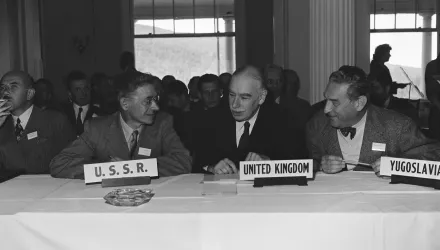International Security is America's leading peer-reviewed journal of security affairs.

This policy brief is based on "What the Iran-Iraq War Tells Us about the Future of the Iran Nuclear Deal," which appears in the summer 2017 issue of International Security.
Bottom Lines
- Security, Not Ideology. The keys to understanding Iran’s actions and intentions can be found in its contemporary history and in the Iran-Iraq War, in particular. Iran’s nuclear and security policies are molded by its experiences in that war.
- Defense and Self-Reliance. Iran views itself as on the defensive and fighting for survival. Also, its leadership believes that the country must be self-reliant in key areas such as national security. The international community’s attempts to moderate Iran’s behavior will be successful only if they reflect an appreciation of Iran’s concerns and beliefs.
- Reintegrating Iran. World powers should adopt a policy of strategic engagement that will reintegrate Iran into the international community and open the way for sustainable solutions to the challenges stemming from the Islamic Republic’s behavior.
Iranians hailed the Joint Comprehensive Plan of Action (JCPOA) nuclear deal as the dawn of a new era for their country: finally, they would be able to settle disputes with the United States and its allies diplomatically. Moreover, President Hassan Rouhani and his team hoped to build on the nuclear deal to tackle other contentious issues at the negotiating table. To this end, they began a dialogue on various domestic and regional matters with the European Union and, for a short time, with the United States. Instead of building on these efforts, President Donald Trump has attacked the nuclear deal while upping the ante with Iran on all fronts, including by declaring his intention to designate the Revolutionary Guards as a terrorist organization. Such moves are counterproductive. The best way to address the various challenges associated with Iranian behavior—meaning the one most likely to succeed and to bolster long-term U.S. security interests—is to preserve and build on the nuclear deal. Doing so would enable Iran to reconsider the lessons of the Iran-Iraq War, which taught it that it cannot trust the international organizations and world powers that seek to isolate it and undermine its security.
Security, Not Ideology
Iranian officials frequently draw on their country’s history to communicate their positions to their allies and adversaries alike. At the heart of the Islamic Republic’s security narrative and policies lies the Iran-Iraq War (1980–88)—a devastating conflict that Saddam Hussein launched just one year after the 1979 Islamic Revolution and that led to hundreds of thousands of casualties and billions of dollars of damage. Appreciating how Iran perceives its experiences in that war is key to understanding its actions and intentions today. Indeed, the country’s nuclear and security policies are molded by its interpretation of the conflict and the lessons that Iranian decisionmakers have drawn from it. A careful examination of Iranian sources, the country’s internal dynamics, and its contemporary history and actions reveals an Iran very different from the one depicted in the conventional wisdom. According to the latter, the Islamic Republic is committed to the idea of itself as a “cause.” Hence, U.S. foreign policy circles have long posited that the regime’s rhetoric and revolutionary ideology hold the keys to understanding its behavior. In contrast, the former reveals a much more pragmatic Iran, one whose views of itself and the world are shaped by its experiences and views of its security, not by ideology.
As a result, to understand Iran’s current actions and intentions and to formulate sound policies that tackle the challenges stemming from the country’s behavior, policymakers should take into account Iranian views and past actions. Moreover, policymakers should place much more weight on what Iran does than on what it says. Indeed, as Iran’s behavior during the war demonstrates, rhetoric and ideology are the tools that the Islamic Republic uses to communicate, not determine, its security outlook and policies.
Defense and Self-Reliance
The Iran-Iraq War taught the Islamic Republic that, to survive, it must adopt a vigilant defense posture and that it must maintain its ability to be self-sufficient to protect its territory and people. Indeed, during the war, Iran found itself isolated and unable to rely on either international organizations or most other states to come to its aid. International condemnations of the Iraqi invasion, of Iraq’s targeting of population centers, or of its use of chemical weapons were not forthcoming. Neither was international financial, political, or military support for Iran, which, along with the outside aid that flowed into Iraq, helped tip the balance of the war in Iraq’s favor. To Iranian leaders, the lesson of these experiences was clear. As a result of its wartime isolation, over the course of the past three decades the Islamic Republic has worked assiduously to increase its military capabilities, particularly its missile program, in order to be able to deter future attacks and defend itself in case deterrence fails and another confrontation ensues.
Iran continues to view itself as being on the defensive and as fighting for survival. Taking Iran’s outlook seriously is critical to understanding its intentions and to dealing with it effectively, especially because what to Iran are defensive measures are to its rivals signs of aggression, as the security dilemma dictates. The country’s defense policies are informed by a distrust of the security arrangements and norms that dominate the international order. This distrust is grounded in pragmatic realism and confirmed by experience, as well as by the perception that the United States and its allies seek to isolate the Islamic Republic when possible. These positions have long shaped Iran’s approach to its military and security policies. They led to Iran’s decision to resume its nuclear program during the Iran-Iraq War and to develop its ballistic missile, drone, and other military programs that today challenge the United States and its allies.
Hence, if policymakers want to convince Iran to change its behavior, they must understand its goals of independence and self-sufficiency. In other words, they cannot expect Iran to fully curtail all the programs and activities that the United States and other countries view as problematic. For Iranian decisionmakers, these same programs and activities are essential to defense and deterrence. This is not to say, however, that Iranian misbehavior should be left unchecked. Rather, policymakers should understand where Iran can and cannot make concessions and should seek win-win solutions that allay Iran’s security concerns, rather than complete capitulation. Indeed, the success of the nuclear talks owes much to the ability of the United States and its partners in the P5+1 (China, France, Germany, Russia, and the United Kingdom) to reach that balance, the result of which was a sustainable deal in the form of the JCPOA and a framework for checking Iran’s nuclear ambitions.
Reintegrating Iran
The most sustainable solution to curtailing Iran’s destabilizing behavior lies in a policy of strategic engagement and reintegration of the country into the international community. This objective can be achieved through economic cooperation, including establishing business ties, but also through political and social engagement with Iran. The European Union, under the leadership of High Representative for Foreign Affairs and Security Policy Federica Mogherini, has worked to build on the JCPOA and to bring Iran into the fold by initiating a series of dialogues on various key challenges stemming from the Islamic Republic’s behavior, including regional security and human rights violations. This is the model to follow. The international community can provide the space for Iran’s dynamic civil society to push for reforms at its own pace, while helping to undermine the belief that the country has to go it alone, a narrative strengthened by the Iran-Iraq War and propagated especially by conservatives and hard-liners. By doing so, policymakers can reach a longer-term solution for the challenges stemming from Iran’s actions.
Preserving the Nuclear Deal
The international community must preserve and continue to build on the JCPOA. By doing so, policymakers can find longer-term and more sustainable solutions to the aspects of Iranian behavior that they find problematic. The international community must follow the European Union’s lead and engage Iran on the more troubling components of its security policies, including its ballistic missile program and its support for terrorist groups and proxy forces in the Middle East and South Asia. Such action will not be possible, however, without preserving the JCPOA and affording Iran some degree of economic recovery, by lifting sanctions and building business ties. Following through on the international community’s, particularly the P5+1’s, promise of reintegrating Iran will help dispel the belief that Iran cannot trust the system, that it must rely only on itself, and that it must be on the defensive—beliefs strengthened in the Iranian psyche as a result of the Iran-Iraq War.
Related Resources
Farideh Farhi, “The Antinomies of Iran’s War Generation,” in Lawrence G. Potter and Gary G. Sick, eds., Iran, Iraq, and the Legacies of War (New York: Palgrave Macmillan, 2004), pp. 101–120.
“Joint Comprehensive Plan of Action” (Washington, D.C.: U.S. Department of State, July 14, 2015), https://www.state.gov/documents/organization/245317.pdf.
Gary Samore, ed., “The Iran Nuclear Deal: A Definitive Guide” (Cambridge, Mass.: Belfer Center for Science and International Affairs, John F. Kennedy School of Government, Harvard University, August 2015), https://www.belfercenter.org/sites/default/files/legacy/files/IranDealDefinitiveGuide.pdf.
Javad Zarif, “Iranian Foreign Minister: ‘Arab Affairs Are Iran’s Business,’” Atlantic, October 9, 2017, https://www.theatlantic.com/international/archive/2017/10/iran-persian-gulf-jcpoa/542421/.
Ariane Tabatabai is a postdoctoral fellow in the International Security Program in the Belfer Center for Science and International Affairs at the John F. Kennedy School of Government at Harvard University.
Annie Tracy Samuel is Assistant Professor of History at the University of Tennessee at Chattanooga and a former research fellow in the Belfer Center for Science and International Affairs at the John F. Kennedy School of Government at Harvard University.
International Security is America’s leading peer-reviewed journal of security affairs. It provides sophisticated analyses of contemporary, theoretical, and historical security issues.
International Security is edited at Harvard Kennedy School’s Belfer Center for Science and International Affairs and is published by The MIT Press.
For more information about this publication, please contact the International Security publications coordinator at 617-495-1914.
Statements and views expressed in this policy brief are solely those of the authors and do not imply endorsement by Harvard University, the Harvard Kennedy School, or the Belfer Center for Science and International Affairs.
Ariane Tabatabai and Annie Tracy Samuel, "Managing U.S.-Iran Relations: Critical Lessons from the Iran-Iraq War" (Cambridge, Mass.: Belfer Center for Science and International Affairs, John F. Kennedy School of Government, Harvard University, November 2017).







